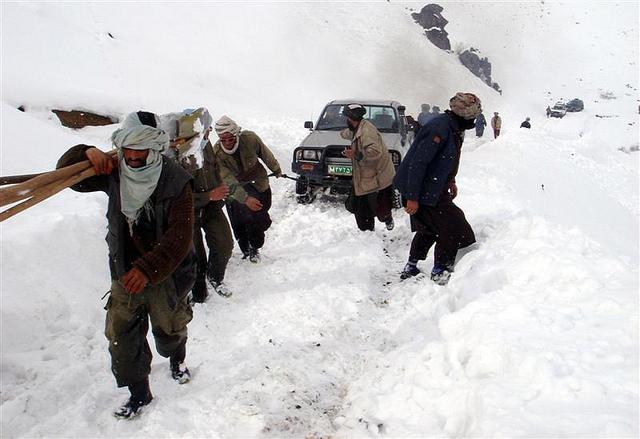Residents of Bamiyan and Daikundi provinces are complaining about the roads being blocked due to heavy storms, snowfalls, and frosts. They are demanding that if the Taliban authorities do not take action, vehicles and passengers will be put in dangerous situations. They are also warning that people will suffer and grocery and fuel prices will increase significantly due to the Taliban‘s lack of planning. The authorities have also confirmed that the Taliban officials have not made any agreements to keep the roads open.
Mohammad, a resident of Waras district in Bamiyan, told Hasht–e–Subh that Waras and Panjab are two of the most disadvantaged valleys in the province. The transportation roads in these areas are always poor, but in winter they become especially difficult to traverse due to increased rainfall and snowfall. He believes that the roads connecting these two districts to the capital of Bamiyan may remain closed for another two weeks.
The Shatu Pass connects Kabul to Ghor and vice versa. Kotal Shatu is located more than three thousand meters above the Azad River, which is between Yakawlang and Panjab districts. During the winter, it is very cold and stormy, which can lead to natural disasters and cause many deaths. Additionally, people in the area say that the cold, snowfall, and storms during winter make it difficult for people to access basic necessities like food and healthcare.
Hamid, a regular driver on the Bamiyan–Kabul highway, told Hasht–e–Subh that the seasonal rain and snow on the road pose life–threatening risks to drivers like him. For example, he mentioned the Hajigak Pass, a route that connects Bamiyan to Kabul through Maidan Wardak, saying that passengers could face death if they pass through the area during winter‘s heavy snowfalls. Additionally, he said that Hajigak Pass is less dangerous than Shibar Pass, which connects Bamiyan to Kabul through Parwan province. However, since the path is long and time–consuming, many drivers still prefer to use Hajigak Pass, which gets blocked for a week each year due to heavy snowfall.
Most people in Daikundi province agree with the concerns that have been raised about the annual road closure during heavy winter snowfalls. Rahmatullah, a resident of Daikundi, told Hasht–e–Subh that the snowfall usually lasts for 7 to 10 days and disrupts the lives of residents, passengers, and drivers. He said that in recent years, several accidents in Miramor have blocked the pathways, resulting in the deaths of many ill people who were unable to reach a hospital. Rahmatullah also mentioned that pregnant women and elderly people have lost their lives due to being stuck on the highways. Habibullah, another Daikundi resident, expressed his worry about the snowfalls and pathways and urged the authorities to create a plan to keep the roads open before the heavy storms and snowfalls put people in danger.
The Ministry of Public Works in Daikundi has not signed any contracts with private snow removal companies this winter season, according to a reliable source. Despite our team‘s efforts, we were unable to get a comment from any Taliban officials. Essentially, to link Kabul to Ghor, Bamiyan, and Daikundi, the roads go through Hajigak Pass, Shibar Pass, Shatu pass, Babak Pass, and Qunagh Pass; as these areas are some of the coldest and most mountainous in the country, even a small amount of rain or snow can block the roads and create difficult conditions for the locals, passengers, and drivers.











